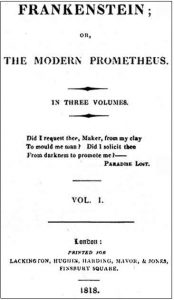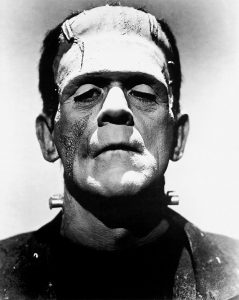Two hundred years ago, author Mary Shelley wrote a remarkable novel— Frankenstein, or the Modern Prometheus—which endures in popularity and bears an increasingly meaningful warning for us today.

(Yes, I know I’m a few months late. Lackington, Hughes, Harding, Mavor, & Jones published the novel on January 1, 1818. Amazing that a publisher was working on New Years Day!)
Today, we know Shelley’s novel mainly from its numerous movie incarnations and from the term “Frankenstein monster” itself, which has become shorthand for creating something with unintended negative consequences. I’ll be commenting on the original story, though, not its later derivative works.

In my own stories, I explore the relationships between people and new technology. That is a key aspect of Frankenstein. In fact, that novel is one of the first ever to consider that theme.
Inventors typically create new technology to improve human life, to meet a need. However, the introduction of new technology can also bring about undesirable changes, including fear, active opposition, unforeseen faults in the tech (bugs), and inventor’s regret.
Not only does Shelley show us all of these aspects in Frankenstein, she turns the table on the whole technology impact concept; her sentient technology reacts to its own existence in a world of people.
To us, her novel seems well ahead of its time. Two hundred years ago, the Industrial Revolution had just begun. Electricity was a new and exciting phenomenon, not yet harnessed for effective use. Scientists were discovering elements and chemicals at a rapid pace.
Up to that time, fiction authors had written of golems and homunculi, humanoids created from magic. No stories yet existed of creating human-like life through science.
Perhaps, to readers of Frankenstein in 1818, then witnessing an explosion of scientific discovery, it might have seemed as if the animation of dead human tissue might well be next week’s news. Two centuries later, we have a better idea of how difficult the feat is. We can manipulate DNA to some extent. We’ve achieved remarkable results in extending human lifespans. We can revive the recently dead through mouth-to-mouth resuscitation and other techniques.

Still, we can’t do what Dr. Frankenstein did…yet. Nonetheless, when I said Shelley’s novel contains a particularly relevant warning for us today, I was referring to science’s quest to create artificially intelligent, sentient, self-aware “life.” This achievement may be decades, or only years, away. The ability for humans to create thinking, human-like life by means other than reproduction will be a breakthrough of far greater impact than any previous scientific development in human history.
We now find ourselves in the role of Dr. Frankenstein before he created the monster. We can consider the ethics of our actions in advance. We can ask if we’re insane even to pursue the enterprise. We can examine and plan for as many possible consequences as we can imagine.
Mary Shelley gave us a novel full of these consequences to consider. From twenty decades in the past, her visage warns us to be careful. She’s cautioning us with a worst-case scenario. If we fail to prepare for these consequences, we’ll have only ourselves to blame.
Thank you, Mary, for your wise counsel. On Frankenstein’s bicentennial, we’re still recklessly curious beings who discover how to do things before thinking whether we should, and before taking appropriate precautions. Maybe things will turn out fine, and much credit will go to you, for your prescient advance notice. Conveying my belated gratitude back through two centuries to you, I’m—
Poseidon’s Scribe
